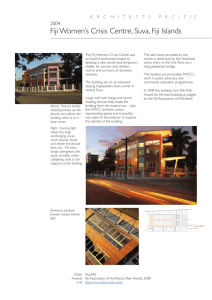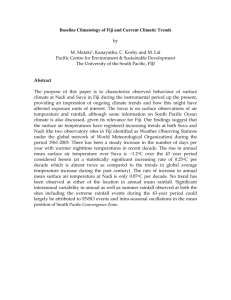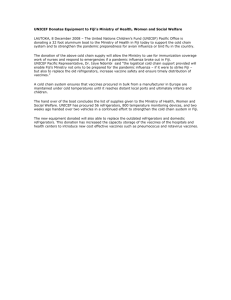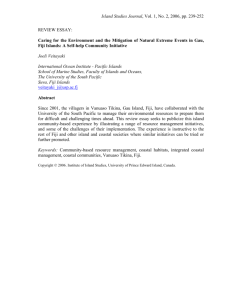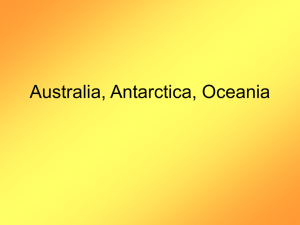Report on the National Workshop on the Implementation of the
advertisement
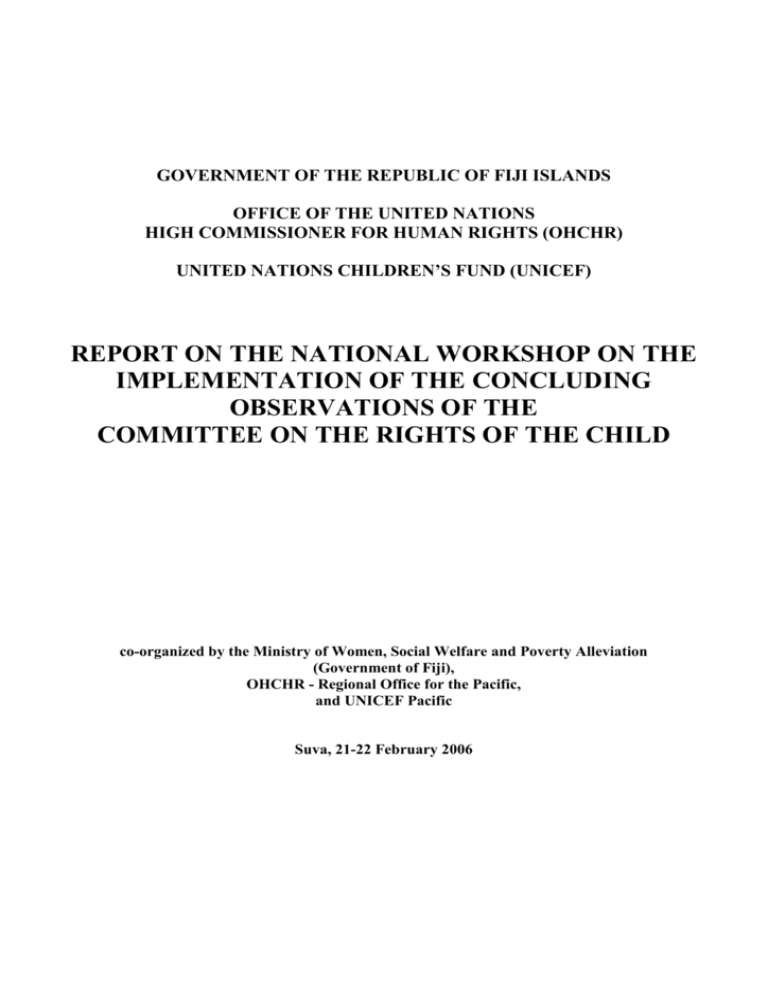
GOVERNMENT OF THE REPUBLIC OF FIJI ISLANDS OFFICE OF THE UNITED NATIONS HIGH COMMISSIONER FOR HUMAN RIGHTS (OHCHR) UNITED NATIONS CHILDREN’S FUND (UNICEF) REPORT ON THE NATIONAL WORKSHOP ON THE IMPLEMENTATION OF THE CONCLUDING OBSERVATIONS OF THE COMMITTEE ON THE RIGHTS OF THE CHILD co-organized by the Ministry of Women, Social Welfare and Poverty Alleviation (Government of Fiji), OHCHR - Regional Office for the Pacific, and UNICEF Pacific Suva, 21-22 February 2006 1. The Ministry of Women, Social Welfare and Poverty Alleviation (Government of Fiji), the Office of the UN High Commissioner for Human Rights (OHCHR), and the United Nations Children’s Fund (UNICEF) co-organized the National Workshop on the Implementation of the Concluding Observations of the United Nations Committee on the Rights of the Child, (hereafter “the Committee”) from 21-22 February 2006 in Suva, Fiji. 2. The Workshop was hosted by the Government of the Republic of the Fiji Islands and attended by officials from various Ministries (Women, Social Welfare and Poverty Alleviation; Education, Health; Justice; Foreign Affairs; Youth; Home Affairs; Labour; Culture; Fijian Affairs; Finance and National Planning), representatives from the judiciary, and participants from the civil society, including national experts, parliamentarians, youth, academics, faith-based and professional groups, as well as representatives of the Fiji Commission for Human Rights and trade unions. 3. The Workshop was opened by Ms. Tokasa Buinimasi, Deputy Secretary, Ministry for Women, Social Welfare and Poverty Alleviation of the Government of Fiji, who welcomed the participants, thanked for organizing the workshop in Fiji and informed on efforts made by her country to accelerate the implementation of the Convention on the Rights of the Child (hereafter “the Convention”). Mr. Jaap Doek, chairperson of the UN Committee on the Rights of the Child, indicated that these kind of follow-up workshops assisted national follow-up processes to implement the recommendations of the UN human rights treaty bodies, including the Committee on the Rights of the Child. He also pointed out that the responsibility of implementing the Convention did not lay exclusively with governments, but was a process involving many other stakeholders, including NGOs, national human rights institutions, parliamentarians, media et cetera. Ms., Shamima Ali, Commissioner, Fiji Human Rights Commission (“FHRC”),, welcome the holding of such workshop and explained the various roles of an independent human rights commission in monitoring the application of an international treaty such as the Convention on the Rights of the Child. Ms. Gillian Mellsop, Representative from UNICEF Pacific, noted the progress made in the implementation of the Convention over the past ten years, including the establishment of the FHRC and the enactment of the Family Law Act (2003), and encouraged participants to continue to work towards strengthening the protection of children’s rights, especially in the area of violence against children. Mr. Paulo David, OHCHR Regional Representative for the Pacific, stressed the importance of organizing events focusing on the implementation of concluding observations of UN human rights treaty bodies and underlined that one of the major focuses of OHCHR’s technical cooperation activities was national capacity-building supporting ratification and implementation of the treaties. He added that periodic reviews provide analytical tools and benchmarks to measure country level achievements as well as remaining challenges. Mr. Irshad Ali of Save the ChildrenFiji, highlighted the various forms of violence that many children in Fiji suffer, including corporal punishment. He further insisted that some children in Fiji are still denied of their fundamental rights to health and education. 4. After the opening segment, a plenary meeting was held at which presentations were made by the Chairperson of the UN Committee on the Rights of the Child on the objectives of the workshop and the common themes of discussion. Mr. Doek also informed participants on the jurisprudence of the UN Committee on the four themes explored b y the workshop. Thereafter, the workshop convened the two first working groups on particular themes: (a) Juvenile justice; and (b) Right to Education; The two other working groups met during the second day of the workshop on (c) corporal punishment, domestic violence and sexual abuse; and (d) Independent monitoring mechanisms. 5. Each working group elected a rapporteur from among the participants and was co-facilitated respectively by two facilitators: -2- WG 1: Juvenile Justice. (Facilitators: Mr. Jaap Doek, UN Committee on the Rights of the Child, and Magistrate Salote Kaimacuata, Ba Magistrate’s Court) WG 2: Right to education. (Facilitators: Richard Wa, UNICEF Pacific and Aleksio Sela, Ministry of Education) WG 3: Corporal punishment, domestic violence and sexual abuse (Facilitators: Lynette Petueli, Save the Children Fiji, and Ms Edwina Kotoisuva, Fiji Women’s Crisis Centre); WG 4: Independent monitoring mechanisms (Facilitators: Jaap Doek, Chairperson of the UN Committee on the Rights of the Child and Deveena Sudhakar-Herman, Fiji Human Rights Commission) 6. The second day of the Workshop began with a recapitulation of the work completed the previous day. Thereafter, participants met again in two working groups and discussed on: “The way forward: identification of common grounds for action”. Participants analyzed the existing mechanisms to follow up to the Committee’s concluding observations (recommendations) in the respective State parties, as well as their advantages and shortcomings. Discussion included the mechanisms’ effectiveness, obstacles preventing them from functioning and possibility for improvements. The groups also discussed the potential role of the United Nations, in particular OHCHR, UNICEF and UNDP, in assisting State parties in the implementation of the Committee’s recommendations at national level. At the end of the day, rapporteurs reported to the plenary on their groups’ activity and presented some concrete recommendations agreed upon by the working groups’ participants. 7. After lunch, a presentation was delivered by the chairperson of the UN Committee on the Rights of the Child, Mr. Jaap Doek, on the two Optional Protocols to the UN Convention on the Rights of the Child, respectively on sale of children, child prostitution and child pornography and the one on the involvement of children in armed conflict. 8. At the end of the second day, the present report was discussed by all participants and agreed upon. 9. During the closing ceremony of the workshop, a group of young participants provided feedback on the two-day workshop and on the situation of children in the country. -3- RECOMMENDATIONS AND COMMON GROUNDS FOR ACTION OF THE WORKSHOP ON FOLLOW-UP GIVEN TO THE IMPLEMENTATION OF THE CONCLUDING OBSERVATIONS FOR FIJI OF THE COMMITTEE ON THE RIGHTS OF THE CHILD Suva, 21-22 February 2006 The Workshop’s participants, including representatives from the Government of Fiji, the Fiji Human Rights Commission, parliament, non-governmental organizations, youth representatives, trade unions, academics, faith-based and community organizations, and United Nations entities participating in the Workshop on the Implementation of the Concluding Observations of the Committee on the Rights of the Child, held in Suva, from 21 to 22 February 2006, agreed on the following recommendations and common grounds for action that represent important steps in enhancing the implementation of the most recent concluding observations adopted by the Committee on the Rights of the Child (UN document CRC/C/15/Add. 89 of 1998). NOTE: the following recommendations reflect the discussions that took place in the respective working groups and therefore are not necessarily pretending to be exhaustive. General recommendations: 1. The Government of Fiji is encouraged to submit as soon as possible its second periodic report (which is overdue since 11 September 2000) to the UN Committee on the Rights of the Child. The report should mainly focus on follow-up measures given to the previous recommendations made by the Committee in 1998; 2. It is recommended that the Coordinating Committee for Children (CCC), the multi-sectoral governmental body in charge of coordinating child related issues, be rapidly made operational again in order to enhance capacity and efficiency of services, programmes, policies and other measures for children. A full time secretariat should be established in order to ensure support, follow-up and implementation of decisions taken by the CCC. The CCC should establish an Advisory Panel that includes children. Finally, the CCC should be provided with statutory powers and full support of the Cabinet of the Prime Minister in order to enhance its capacity. 3. The following recommendations will be submitted to the Prime Minister Cabinet, through the Ministry for Women, Social Welfare and Poverty Alleviation, and to Parliament. A. Juvenile justice Participants took note of the following positive developments since 1998: judicial training has been undertaken since 2002 in the field of juvenile justice; children in conflict with law were sometimes involved in these training programmes specific youth courts have been established in 2003 in Suva and Lautoka pre-trial detention is only applied to children in the most exceptional cases the revival in 2003 of the Police Juvenile Bureau courts are increasingly referring in their decisions to the Convention on the Rights of the Child Fiji’s membership of the South Pacific Council of Youth and Children’s Courts Participants further recommended the following: -4- 1. strengthen prevention strategies and measures taking into account the support system of the community, especially with regard to vulnerable children, such as those living in poverty, dropping out of school, without family care or living in a violent environment; 2. improve preventive measures, especially through the provision of parental skills, social services and counselling and community involvement; 3. continue, and strengthen, the measures for the establishment and enforcement of laws, procedures, authorities and institutions that are specific for all persons below 18 alleged as, accused of, or recognized as having infringed penal law, in light of article 40.3 of the Convention; 4. amend the Juvenile Act in order to ensure its full compatibility with the provisions and principles of the Convention on the Rights of the Child; in particular by raising the minimum age of criminal responsibility to a more acceptable international standard and increasing the age of penal majority from 17 years to 18 years to ensure that all persons below 18 in conflict with the law fully benefit from special protection measures; 5. ensure that progressively all districts of the country have their own juvenile courts; or alternatively that periodically ordinary courts function as juveniles courts to deal with children in conflict with the law; 6. take measures to reverse the negative perception within the justice system and in society in general of juvenile justice as a “soft response to crime’ to ensure that it is understood as a fair, rehabilitative and more constructive system for children and society in general; 5. strengthen the collection of data and indicators, which should be systematically collected and disaggregated by age and sex; ensure that common indicators are used by all agencies concerned (police, courts, social welfare, etc.); 6. coordinate, support, finance and promote the use of as much as possible alternative sanctioning of children in conflict with the law, such as community work programmes and other alternative communitybased rehabilitation measures, in line with the provision of the Convention especially article 40.3.b; when used, community work programmes should be closely monitored by competent supervisors and bodies; 7. expand the model of family group conferencing as a potential alternative to judicial sanctions, as used at Suva Juvenile’s Court; 8. take all necessary measure to ensure that when traditional justice is applied to children, the process and sanctions are entirely compatible with domestic legislation and procedures as well as the Convention, especially its articles 2, 3, 6, 12, 37, 39 and 40; ensure that corporal punishment, such as flogging, is never used under traditional justice systems; 9. continue to train and re-train all judges, lawyers, police officers, social workers and other service providers in children’s rights; 10. take immediate measures to ensure systematic separation in institutional settings, such as the Boys Home in Suva, of young offenders from non-offenders, such as juvenile victims of abuse; 11. take all measures to ensure that deprivation of liberty of persons below 18 is only a measure of last resort and for the shortest appropriate period of time; that when deprived of liberty they are separated from detained adults and detained in decent conditions, benefiting, inter alia, from access to proper -5- nutrition, health, education, medical and other social services, in compliance with the United Nations Rules for the Protection of Juveniles Deprived of their Liberty ; 11. take measures to guarantee that the right to privacy of children involved in the justice system is fully respected, including by the media; names and pictures of persons below 18 in conflict with the law should not be disclosed by the media or other parties; 12. review existing regulations and laws and strengthen their implementation to ensure that the criminal records of persons under the age of 18 having infringed penal law are not bearing any kind of negative impact during the rest of their life; 13. provide systematically legal representation to all persons below 18 in conflict with the law, at all stages of the process (police, pre-trial and trial); ensure the provision of additional financial resources in this area either to the Legal Aid Commission or another appropriate institution; 14. reactivate the juvenile justice working group under the Coordinating Committee for Children (CCC); 15. ensure that the present recommendations are brought to the attention and mainstreamed in the work of the AusAID Law and Justice Sector Program; and 16. seek, whenever appropriate, international cooperation in the form of technical assistance and advice from, among others, OHCHR, UNICEF and UNODC. B. Right to Education Participants took note of the following positive developments since 1998: globally, enrolment rates have increased and drop out rates have decreased the Minister of Education, through the Education Gazette Volume III of Term III, 2003, informed teachers that “the infliction of corporal punishment was no longer allowed” in schools the adoption of a Education Summit Master Plan in 2005 a compulsory education system is in place at policy level and all primary and secondary students have access to tuition fee free education special education has become part of teacher training curricula in some institutions pre-school education has been included in the national education framework Participants further recommended the following: 1. that education be made compulsory by law and available free, including with regard to hidden costs, to all at primary level, and if possible at secondary level; 2. address the hidden cost of education which has drastically increased over the past years, especially with regard to cost related to the purchasing of school uniforms, stationary, books and other educational materials, transportation and food; and establish a body to coordinate the various options for scholarships to improve access to education for all children, especially the ones from low socio-economic background and coordination of the provision of financial support to them; 3. improve access for children with disabilities, including through promoting their inclusion through the mainstream education system by improving facilities; -6- 4. strengthen and implement early childhood education countrywide, as a foundation for later development and learning at all levels, by providing curriculum guidelines for 0 to 5 years and adequate salary scale; 5. improve teachers training and levels of qualification by facilitating access to scientific and technical knowledge and modern teaching methods and provide in-depth pre- and in-service training on children’s rights; 6. strengthen vocational training by improving and promoting its quality as a valued and alternative relevant qualification; 7. human rights education, including children’s rights, should become part of the national school curricula in light of article 29 of the Convention and General Comment No. 1 of the Committee on the Rights of the Child; as part of human rights education, issues such as children’s rights and respect for culture and diversity of people be taught to children from a young age; 8. make reproductive health and life-skills education for survival, development and protection compulsory at all developmental stages of education; 9. extend access to education to children and young adults returning to school eg. Matua program 10. formulate and implement school policies that advocate zero tolerance for violence in schools (bullying, emotional and physical abuse); continue to train teachers in non-violent methods of discipline in order to decrease the use of corporal punishment in schools in line with the Ministry of Education policy; 11. re-visit and strengthen the protocols existing between schools, police, health and social welfare departments; 12. increase child rights based guidance and counseling available in all schools; and 13. strengthen the periodic monitoring of the education system framed by the Convention on the Rights of the Child, especially with regard to access, quality and child protection. C. Corporal punishment, domestic violence and sexual abuse Participants took note of the following positive developments since 1998: Since the 2001 High Court ruling declaring that corporal punishment in schools is unconstitutional Enactment of Family Law Act (2003) Drafting of Domestic Violence Bill Landmark court decisions – on recognising the effects of children witnessing violence, removing the requirement of corroboration as a matter of rule and practice and leaving it to the discretion of the Magistrate or Judge development of (i) minimum standards for children living in residential and detention homes; and (ii) care planning Community-based prevention of child abuse and neglect program implemented by Ministry of Women, Social Welfare and Poverty Alleviation and NGOs. Forthcoming review of the Penal Code that would also take into account sexual offences against children. -7- Bachelors in Social Work soon available at the University of the South Pacific. Participants further recommended the following: 1. enact legislation requiring all professionals, including police, teachers, doctors or health personnel, to report suspected child abuse of different natures to relevant authorities. Conduct a feasibility study in regards to extending this requirement to the wider community and who / where this is reported to; 2. implement the recommendations made by the Fiji Law Reform Commissions Report for children: A review of Laws Affecting Children 2000 and submit for immediate consideration by the Fiji Law Reform Commission’s review of the Penal Code; 3. strengthen systems for monitoring and reporting child abuse and processes relating to the collection of evidence; 4. reactivate and provide adequate resources to the Inter-agency Committee on Child Abuse, Neglect and Abandonment so that it is able to coordinate the protocol’s and activities of relevant agencies preventing and responding to incidences of child abuse and neglect; 5. strengthen measures to raise awareness of child abuse, including community based strategies to prevent and respond to child abuse; 6. provide systematic and ongoing training for police, health workers, social welfare officers, prosecutors, magistrates and other professional groups on child abuse and neglect; 7. examine, coordinate and strengthen services for child victims including police, health and social welfare, including the efficiency of the provision of services to victims; 8. ensure the provision of counselling to all child victims of abuse for their recovery and rehabilitation, including the availability of immediate counselling for victims by employing child psychologists to work with the police and the Department of Public Prosecution; 9. establish and resource with qualified persons a national help-line for children to discuss issues concerning them and also report child abuse; 10. undertake a nationwide sustained and ongoing awareness raising campaign and related sensitization activities on the negative consequences of corporal punishment and on alternative forms of discipline involving parents, community and religious leaders; and 11. enact legislation to ban all forms of corporal punishment and in any situation, including within the family, the school, institutional care and the community at large. D. Independent monitoring mechanisms Participants took note of the following positive developments since 1998: the establishment in 1998 of an independent national human rights institution, namely the Fiji Human Rights Commission (FHRC) the nomination in 1998 of a focal point for children in the FHRC to deal with child rights issues -8- the fact that the Fiji Human Rights Commission regularly deals with cases concerning persons below 18 the Fiji Human Rights Commission provides when needed legal representation of children in courts Participants further recommended the following: 1. in the short term, the role of the Child Desk Officer at the Fiji Human Rights Commission (FHRC) should be expanded and provided with adequate resources by government and other agencies; 2. as a the long term plan, there should be a Children’s Commissioner established, independent from government, in consistency with the General Comment No 2 (2002) of the UN Committee on the Rights of the Child; 3. once the Coordinating Committee for Children (CCC) is reactivated it will advocate for the establishment of the Children’s Commission, with wide consultation with government and nongovernment stakeholders; 4. accessibility by young persons to the Fiji Human Rights Commission should be made more easily in order to allow them to seek information and advice, or to file a complaint about violation of their human rights. In that regard, it is recommended to establish networks of free telephone help-lines, with qualified inter-disciplinary staff, to explore and use the possibilities of Internet, and to consider the creation of local branches or the appointment of local contact/resource persons, particularly in more remote areas, including islands, of the country; and 5. children and youth groups, NGOs, professional groups and other relevant individuals or groups should engage in partnerships with the Fiji Human Rights Commission in order to increase the impact of its work. Suva, 22 February 2006 -9-
